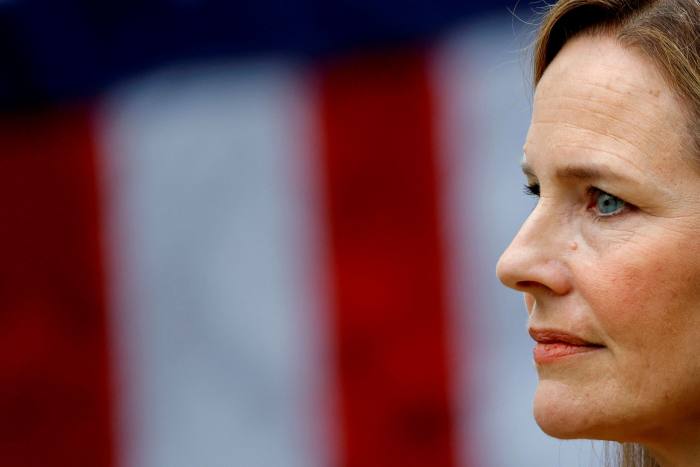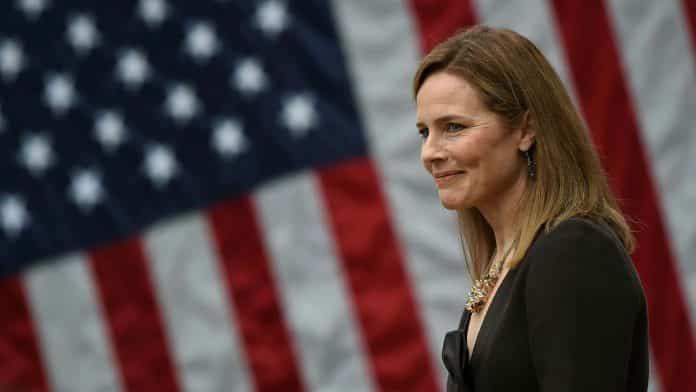Donald Trump on Sunday raised the prospect of the Supreme Court striking down the Affordable Care Act just a day after announcing his third nominee to the US high court.
The healthcare law introduced under Barack Obama is set to be a key flash point in next month’s confirmation hearings for Amy Coney Barrett, Mr Trump’s Supreme Court nominee.
Ms Barrett has previously criticised a 2012 Supreme Court ruling that narrowly upheld the ACA, also known as Obamacare. The court is set to consider the law again in November just a week after the presidential election.
“Obamacare will be replaced with a MUCH better, and FAR cheaper, alternative if it is terminated in the Supreme Court. Would be a big WIN for the USA!” Mr Trump tweeted. The Trump administration has been arguing in court for the law to be struck down.
Though Democrats currently lack the votes in the Senate to block Ms Barrett’s appointment, they are hoping to use the confirmation process to elevate the issue of healthcare in the minds of voters ahead of the November 3 election.
“The American people understand that they’re being cut out of this process they’re entitled to be part of . . . in order to take away the ACA, and their healthcare in the midst of a pandemic,” said Joe Biden, the Democratic presidential candidate, at an event in Wilmington, Delaware.
Nancy Pelosi, the Democratic speaker of the House of Representatives, told CNN on Sunday: “Anyone that President Trump would have appointed was there to undo the Affordable Care Act. That is why he was in such a hurry.”
The ACA was signed into law by Mr Obama in 2010 and has so far largely survived repeated legal challenges from conservatives. More than 20 million Americans have gained healthcare coverage since its passing. The act also bans insurers from discriminating against people with pre-existing conditions.
In 2012, Chief Justice John Roberts sided with the Supreme Court’s liberal wing in a 5-4 ruling that said it was constitutional. Ms Barrett in 2017 criticised that ruling in a law review article, arguing that Mr Roberts had “pushed the Affordable Care Act beyond its plausible meaning to save the statute”.
On November 10, the Supreme Court will hear arguments about the ACA again. The law had imposed a penalty on Americans who did not purchase healthcare insurance, an “individual mandate” that the 2012 ruling interpreted as a tax, but Congress in 2017 set the penalty at zero.
A Texas judge in 2018 ruled that the entire law was therefore unconstitutional. The Supreme Court, with Ms Barrett’s likely appointment giving the court a 6-3 conservative majority, is set to rule on that question, along with whether the rest of the law can stand if the individual mandate falls.
The Republican-controlled Senate judiciary committee has announced three to four days of hearings on Ms Barrett’s nomination, starting on October 12.
Polling published by the New York Times on Sunday showed that 56 per cent of voters believed that the winner of the forthcoming presidential election should nominate a successor to Ruth Bader Ginsburg, the liberal Supreme Court justice who died this month.
In a Fox & Friends Weekend interview, Mr Trump also said it was possible that the court, with three of his nominees, would rule on Roe v Wade, the decision that created a constitutional right to abortion in the US.
“Maybe they do it in a different way. Maybe they’d give it back to the states,” Mr Trump said. The president has previously vowed only to pick justices who would overturn Roe v Wade.
Who are the People of Praise?

With Amy Coney Barrett, Donald Trump’s third nominee to the Supreme Court, set to testify before the Senate next month, a key area of scrutiny is her membership of a Christian community called People of Praise.
The small group, started in South Bend, Indiana, in 1971, requires members to make a life-long covenant to the community and pay 5 per cent of their gross income. Its beliefs include speaking in tongues and faith healing.
The community has 1,700 members, each of whom are assigned “heads” — mentors who they consult on major life decisions. “Heads do not make decisions for others, but are there to help each person to discern freely what they should do in the Lord,” the group said in 2018.
For married women in the community, their husband is automatically their “head”, but they also have a “woman leader” — the position was previously called a “handmaid”, though the term is not related to the HBO dystopian series “The Handmaid’s Tale”.
Ms Barrett’s links to the group include her father’s former membership of People of Praise’s board of governors, and also two years as a trustee of one of the community’s schools, Trinity School. She has not faced questions about the group previously. In 2017, when she was confirmed as an appeals judge, she did not disclose her membership to the Senate.
Her friends and allies have argued that the group is misunderstood. John Garvey, the president of the Catholic University of America who was once a professor to Ms Barrett, wrote in the Washington Post that People of Praise was “focused on community, fellowship and the gifts of the Holy Spirit”.
He said of Ms Barrett and her husband, “No one who knew [the] couple would suppose that [she] needed instruction on how to think”.
But some members have called the group a cult, and criticised the system of “headship” as authoritarian. One former member, Adrian Reimers, wrote in a 1997 paper that it implied that each member’s “life is not his own, his or her self is not his or her own”.





